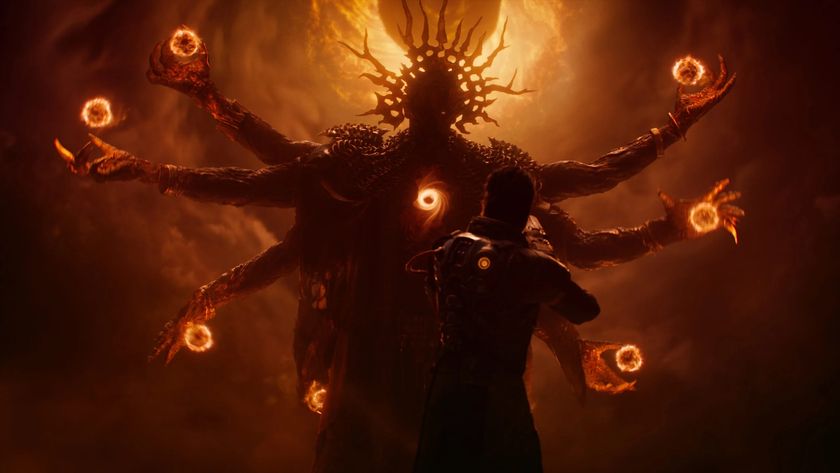What if everyone behaved the same way with games?
Imagine a world where everyone was a cheater, or a fanboy, or a non-team-player
What if...
...everyone was a fanboy/girl?
Imagine a world where everyone owned only one platform and discounted the possibility that good games could ever exist on other systems. A world where every comment in a review calls into question the writer's integrity whenever an “incorrect”score were assigned to the fanboys' chosen/opposed platform? Of course, all the reviewers would have to be fanboys as well, so games on their chosen systems would get favored scores while the opposite would get skewed-low scores. What's funny to me is that real life fanboys already see reviewers as opposed fanboys whether they are or not.
What I wonder is, how would it affect game development and releases? The devs would have to be fanboys too, so either they would only develop games for their chosen platforms, or in the case of multi-platform releases, they would surely do half-assed work on alternate platforms. We'd have to assume that within any studio, not everyone would be the same fanboys (at least with third-party developers for obvious reasons) and so we'd have dev teams essentially self-sabotaging as certain team members try hard to make a certain platform's game of high quality while others couldn't care less.

Above: Not quite a fan "boy"
What do you think? Would opposing fanboys cancel each other out, or would it be disastrous to the industry? I want to believe it would be terrible for the industry, but at the same time, ifdevs could vigorously push to get assigned only to projects on platforms they loved, could it be good for games? Then we might have a bunch of devs working with fervent passion to design a game that would perfectly suit the platform. On the other hand, it could produce sloppy games because the blind love of a platform that can do no wrong could result in games that don't suit the hardware (like if a dev tried to create an MMO for the Wii, for instance – and no, Monster Hunter Tri doesn't count)
One thing's for sure: fanboyism would implode in the field of expressing opinions, because nobody's statements about a game could be trusted (even from a non-biased audience), and those listening would be fanboys themselves, automatically discounting statements that didn't match their beliefs, even if those statements were valid, because fanboys are right at least some of the time.
Of course, in a way, this is just saying, "All discussions about games would be like any discussion on the internet."
...everyone only bought games that got great reviews?
A lot of huffing and puffing gets thrown around when it comes to review scores (our site not excluded), and especially the almighty Metacritic. Developers and publishers make a big deal out of their Metacritic scores, and not just because they want to have their games viewed as objectively good, but even more so because of the belief that high scores translate to high sales. There must be some correlation there, even though we can all think of exceptions to the rule.
Sign up to the 12DOVE Newsletter
Weekly digests, tales from the communities you love, and more

Above: "So I was thinking of buying some games targeted at our demographic, but then I checked the review scores"
Yet if everyone only bought games that let’s say scored 8/10 or higher (since somehow 7/10 has become the new “mediocre”), what would happen to the industry? First of all, in the immediate term, companies specializing in shovelware would immediately go out of business. Larger companies that produce both high and low quality games would have to change their business plans. The practice of offering pre-orders would go extinct (whether that’s a good thing or not, I’m not sure). Obviously, the average quality of games would go up, even though reviewer scores have a huge amount of wiggle room for subjectivity. Yet something weird would certainly happen: games media would have to shift their scoring criteria, because not all good games are equal. In a way, it’s a distilled version of what everyone refers to as the 7-10 scoring system. Score systems would have to adjust so that what is now considered an 8/10 (“great” on the GamesRadar scale) would have to be the equivalent of a 1/10. While that seems absurd, let’s follow the behavior further down the road – now, gamers are only buying games worthy of 8/10 or higher on this new, inflated scale. We can see that then games would have to continuously improve in quality to meet the demands of a world of demanding gamers.
The opposite course of action, then becomes obvious – if everyone bought bad games, the quality of all games would drop continuously. Although the real world doesn’t work in these two extremes,they do serve as a model for what these types of behaviors promote.
...everyone played team games selfishly?
We’ve all encountered the solo-Rambos – those players who could give a damn about teammates, who have the ability to heal or resupply you and yet run right past you when you’re injured and politely macroing (not spamming) “We need a medic!” What kind of a game world are the Rambos contributing to? If everyone followed their lead, team-based games would become weird, and arguably very dull. One strange thing is that the actual results of team vs team matches might not really change. If everyone plays for themselves, no team will use teamwork to dominate the opposition. Matches would be won and lost without much change in the results.
However, the gameplay itself would certainly change, and it would become more homogenous. Most people would probably play offensive-style classes, although we could imagine some support classes getting used as long as they have self-promoting abilities like self-healing.

Above: "I could be healing my teammates, but I think I'll just heal my turret since it will get me kills"
Developers wouldn't see any point in adding in team-oriented features, so games would not only become more simplistic, they'd again become more and more similar. Every shooter would be about shooting and almost nothing else. Players would also be like wolves at a kill, all scrambling to get in each other's way to be "the best." It remindsme of the old saying about crabs in a bucket. Supposedly, as long as you have more than one crab in a bucket, there's no need for a lid, because the crabs will pull each other down in attempts to escape. By not working together, none of them escape. Crabs should really spend more time reading Kant.
...developers made multiplayer/co-op for all games?
Here's one that seems to be approaching reality. How often now does it seem that multiplayer or co-op modes are getting shoe-horned into games because some market research has shown that games with those components sell more? With all those resources spent on multiplayer, surely it affects the quality of the single-player. I'm not saying the single-player parts of games are made bad by adding multiplayer, but let's imagine what BioShock 2's single-player might have been like if all the money and man-hours spent developing multiplayer had been funneled into making the single-player that much better.

Above: We were worried about how multiplayer could even fit into BioShock's world, but it turned out to be pretty cool anyway
In economics, specialization was developed for a very good reason: if you have people or resources working on a narrowly focused task, they become better at it. Game companies have partially applied this method by outsourcing multiplayer to companies that specialize in multiplayer modes. It's a smart approach, but still, we're looking at money diverted to these outside teams that could have been spent on single-player.
I'm not anti-multiplayer at all - I've bought plenty of games that had single and multiplayer components with the intention of mostly playing the multiplayer. I'm also not saying that it's always better to focus solely on one game type. But in a world where every game may soon have multiplayer and co-op elements, will purely single-player experiences suffer? Logic would dictate yes, because there are always limited resources to spread around.
...everyone was an asshole?
Yeah, we can say cheaters are assholes, but I’m talking about the racists, sexists, whiners, xenophobes and griefers. Hell, Xbox Live seems to contain roughly 60% douche-wads. Imagine if everyone behaved this way. At some point, insults would become meaningless because everyone used them (we all can already think of one homophobic slur so overused that it's become about as offensive as a burp). There would probably be a sort of arms-race, where common insults would lose their power and so creative types would have to think of new ways to be verbal assholes. But there are probably limits, mostly in the general populace's imagination, of how far the language could be taken. Eventually, being an asshole wouldn't really be asshole-ish anymore - it would just be the norm. Logically, it would become meaningless.

Above: “You f---ing suck at tanking, moron!”
Then think about griefing. What if everybody was a griefer? Team-based multiplayer would become meaningless because nobody would be on a team anymore. Developers would have to only include one game type in their multiplayer - Free for All - except then we wouldn't be griefing anymore, would we? The behavior collapses on itself. So if you've ever shot a teammate in the back "just that one time, just for laughs" take a moment to consider how your actions helped contribute to a world where team-based multiplayer wouldn't be able to exist.
Kant was a better man than most of us. He imagined a world where we would all act on principle, not on circumstance. You don't steal because stealing is wrong, and that's it. And he expected all of us to live by these principles. In the real world, living your life through Kantian ethics seems impossible - and maybe it is. It doesn't mean his line of thinking isn't useful, though. Sure, you could rationalize stealing a pen from your work because it's such a tiny thing, and besides, your work can afford it (or maybe, your work "screwed" you in some way so it's only fair). Yet the values attached to such an action are relative, and arbitrary. If it's okay for you to steal that pen, shouldn't it be okay for someone to steal a pen from you? And if a pen, why not something slightly more valuable, because really the value of a pen could be anything depending on how someone sees it.
Most people, of course, see stealing a pen and say, stealing a car as two very different things. Kant said there is no difference, because stealing is wrong. That's why it's so hard to follow his ethics - most of us see levels of wrongness. Yes, stealing a pen and stealing a car are both wrong, but stealing a car is more wrong. Way more, most would say.
Now let's take it back to games. Can we really expect to live up to high principles when playing games? Probably not. But before you impulsively perform some action in a game to suit whatever desires your brain craves in the moment, try stopping a second and asking yourself - if it's okay for me to do this, what would the gaming world be like if it was okay for everyone to do this, whenever they wanted?
Aug 12, 2010


Change the way you think to get better at games Break your psychological chains and rule the virtual world

Why Alan Wake's DLC is a brilliant download but a dangerous precedent
If you liked Alan Wake, you'll love The Signal. But you might see the original game in a new light
Opinion: World of Warcraft - Is it normal to want to play a game you hate?
Or 'The last time I ever take Mr T's advice'
Most Popular







